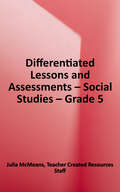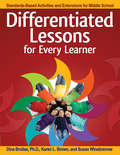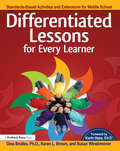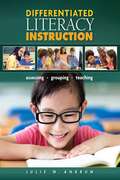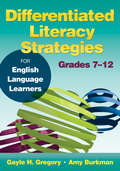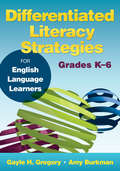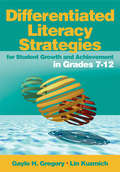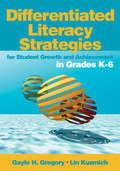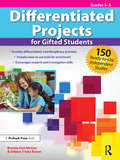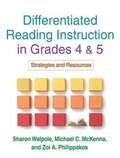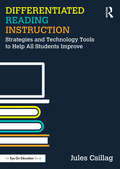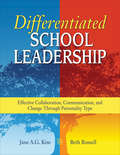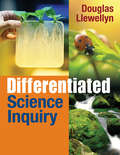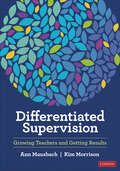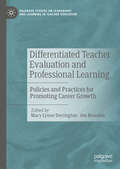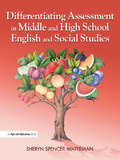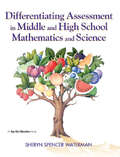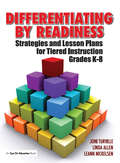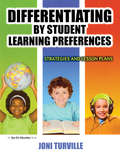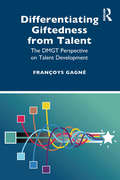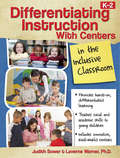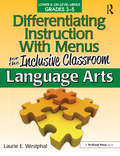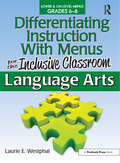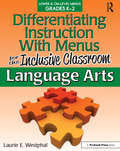- Table View
- List View
Differentiated Lessons and Assessments: Social Studies
by Teacher Created Resources Staff Julia McmeansPractical strategies, activities, and assessments help teachers differentiate lessons to meet the individual needs, styles, and abilities of students. Each unit of study includes key concepts, discussion topics, vocabulary, and assessments in addition to a wide range of activities for visual, logical, verbal, musical, and kinesthetic learners. Helpful extras include generic strategies and activities for differentiating lessons and McREL content standards.
Differentiated Lessons for Every Learner
by Susan Winebrenner Dina Brulles Karen L. BrownDifferentiated Lessons for Every Learner supports middle school teachers in teaching all students, including those with high ability. The book contains lessons in each content area with learning activities that align to the national content standards, embed ELA Common Core Standards, and correlate to DOK levels. The lesson extensions provide for active learning tailored to address multiple learning levels. Using this semi-structured process ensures differentiated learning experiences that align to the standards while also respecting that students have different interests, different methods of learning, and most importantly, that they are learning at different challenge levels. The time is now upon us to emphasize interdisciplinary learning experiences that provide real-world connections and engage students in relevant and meaningful learning. We have long known that while critical for gifted and talented students, these higher level thinking strategies benefit allstudents.
Differentiated Lessons for Every Learner: Standards-Based Activities and Extensions for Middle School (Grades 6-8)
by Susan Winebrenner Karen L. Brown Brulles DinaDifferentiated Lessons for Every Learner supports middle school teachers in teaching all students, including those with high ability. The book contains extension lessons in each content area with learning activities that align to the national content standards, embed ELA Common Core Standards, and correlate to DOK levels. The extension lessons provide for active learning tailored to address multiple learning levels. Using this semi-structured process ensures differentiated learning experiences that align to the standards while also respecting that students have different interests, different methods of learning, and most importantly, that they are learning at different challenge levels. The time is now upon us to emphasize interdisciplinary learning experiences that provide real-world connections and engage students in relevant and meaningful learning. We have long known that while critical for gifted and talented students, these higher level thinking strategies benefit all students.Foreword by Karin Hess, Ed.D.Grades 6-8
Differentiated Literacy Instruction: Assessing, Grouping, Teaching
by Michael C. McKenna John Z. Strong Zoi A. Philippakos Sharon WapoleThe goal of this book is to answer the question What is differentiated instruction? It offers pre-service and in-service teachers the background and foundational skills they will need to understand, plan for, and achieve effective differentiated literacy instruction in their classrooms, based on individual student needs. Chapters provide essential information about how to analyze and synthesize data from assessments, use the information for grouping students, and then plan and implement differentiated instruction. Many specific, hands-on descriptions and exhibits are provided. Case studies of real classrooms demonstrate effective differentiated instructional techniques. End-of-chapter Practical Application questions allow readers to apply chapter concepts as they learn to motivate and teach diverse learners.
Differentiated Literacy Strategies for English Language Learners, Grades 7–12
by Gayle H. Gregory Amy J. Burkman100 ways to keep adolescent ELLs engaged This versatile handbook is for middle school and high school educators who need to differentiate literacy instruction for adolescent ELL students at various stages of literacy competency. Adapted from the highly successful Differentiated Literacy Strategies for Student Growth and Achievement in Grades 7–12, the authors use brain-based strategies and texts that appeal to older learners who may have had interrupted formal education or come from newly arrived immigrant populations. More than 100 hands-on tools help teachers develop students’ competencies in: Content areas, including vocabulary, concept attainment, and comprehension Technology, such as information searching, evaluation, and synthesis Creative applications and 21st century skills ·
Differentiated Literacy Strategies for English Language Learners, Grades K–6
by Gayle H. Gregory Amy J. BurkmanEffective ways to help ELLs excel The key to successfully teaching English learners is focusing on literacy. Adapted from the highly successful Differentiated Literacy Strategies for Student Growth and Achievement in Grades K–6, this book provides a wealth of practical literacy strategies tailored for students who have had interrupted formal education or come from newly arrived immigrant populations. Teachers will find an instructional and assessment framework designed to promote these critical competencies: Functional literacy in phonics, spelling, and reading; Content-area literacy for vocabulary, concept attainment, and comprehension; Technological literacy for information searching, evaluation, and synthesis; Innovative literacy for creativity, growth, and lifelong learning.
Differentiated Literacy Strategies for Student Growth and Achievement in Grades 7-12
by Gayle H. Gregory Linda M. KuzmichUse high pay-off instructional strategies to accelerate literacy learning in the differentiated classroom! From best-selling authors Gregory and Kuzmich comes a versatile handbook for middle school and high school educators who need to differentiate literacy instruction for adolescent and teen learners at different stages of development along the literacy continuum. Containing more than 100 planning models, checklists, rubrics, lesson plans, and more, this book aids teachers in: Pre-assessing adolescent and teen learners for literacy skills and competencies Selecting and differentiating an array of appropriate instructional strategies Using literacy models that can accelerate learning to help diverse learners grow as fast and as far as they can in literacy
Differentiated Literacy Strategies for Student Growth and Achievement in Grades K-6
by Gayle H. Gregory Linda M. KuzmichThe most effective literacy strategies for ALL the young readers, writers, speakers, and listeners in your diverse classroom! Emerging learners, developing learners, and fluent learners at all stages of development along the literacy continuum-those are the learners in today’s elementary classrooms. With this latest work, noted authors Gregory and Kuzmich give teachers an instructional and assessment framework designed to promote multiple competencies in literacy. With a focus on research-based, data-driven, and differentiated strategies, teachers are offered a guide to: Pre-assessing diverse learners for literacy skills, competencies, learning styles, and learning gaps Implementing a broad array of high-payoff and developmentally appropriate strategies Creating units, lessons, and adjustable assignments that address multiple competencies in literacy learning
Differentiated Projects for Gifted Students: 150 Ready-to-Use Independent Studies (Grades 3-5)
by Debbie Keiser Triska Brenda Holt McGeeKids love exploring complex topics, and the more than 150 ready-to-use projects in this book will get their minds working and their hands investigating as they complete fun tasks like “Can You See Sound?” and “It's All in the Advertising.” The research-oriented activities in this book will help teachers provide differentiated learning experiences for advanced and gifted learners based on grade-level content. Each project is written for learners in grades 3-5 to use independently, and the teacher-friendly projects require few additional materials and very little guidance. The projects are fully integrated, with many employing skills from several content areas. Learners will use 21st-century skills as they explore grade-level content more deeply through specific, intensive online research.Grades 3-5
Differentiated Reading Instruction
by Michael Mckenna Sharon WalpoleThis bestselling book provides a research-based framework for making differentiated instruction work in the primary grades. It includes scientifically validated techniques for teaching each component of the beginning reading program. The authors describe how to use assessment to form differentiated small groups and monitor student progress; plan which skills to target and when; and implement carefully selected instructional strategies. Vivid classroom examples illustrate what differentiated instruction looks like in action in each of the primary grades. For additional helpful resources, including classroom-ready lesson plans, teachers can purchase the complementary volume, How to Plan Differentiated Reading Instruction Resources for Grades K-3.
Differentiated Reading Instruction: Strategies and Technology Tools to Help All Students Improve
by Jules CsillagLearn how tech tools can make it easier to differentiate reading instruction, so you can reach all of your students and help them increase their fluency and comprehension. This practical guide brings together evidence-based principles for differentiated reading instruction and user-friendly tech tools, to help middle level students grow as readers in fun, interactive, and engaging ways. You’ll find out how to: Use text-to-speech tools to facilitate decoding and fluency development; Develop tech-based vocabulary lessons for direct and contextual instruction; Get your students engaged in research and nonfiction texts with videos, custom search engines, and interactive annotation tools; Differentiate your fiction reading instruction with visualization, prediction, and summarization exercises; Encourage students to enhance their reading through using dictation software and diverse Google tools; Create your own formative and summative assessments for students at all levels of reading ability. Throughout the book, ideas are provided for both basic technology use and for more advanced applications--so no matter your comfort level with technology, you’ll find strategies that you can implement in your classroom immediately.
Differentiated School Leadership: Effective Collaboration, Communication, and Change Through Personality Type
by Jane A. Kise Dr Beth Ross-Shannon RussellThis resource shows how an understanding of personality types and adults' individual leadership styles helps build school teams that can collaborate and distribute leadership responsibilities more effectively.
Differentiated Science Inquiry
by Douglas J. LlewellynIgnite science learning with differentiated instruction One type of science instruction does not fit all. Best-selling author Douglas Llewellyn gives teachers standards-based strategies for differentiating science education to more effectively meet the needs of all students. This book takes the concept of inquiry-based science instruction to a deeper level, includes a compelling case study, and demonstrates: Methods for determining when and how to provide students with more choices, thereby increasing their ownership and motivation Ways to implement differentiated science inquiry in the main areas of science instruction Strategies for successfully managing the classroom
Differentiated Supervision: Growing Teachers and Getting Results
by Ann Mausbach Kimberly MorrisonStrategic observation practices to drive coherence and results Supervision is often dreaded by teachers and principals alike because it can be disconnected from the context of the actual classroom and school. But when a culture of supervision is created – by differentiating which practices have the greatest impact in the context of the work educators are doing at the building and individual level – then supervision is about examining practice, working together to solve problems, and constantly improving. Differentiated Supervision shows you how to develop a laser-like focus on improving an entire system while simultaneously addressing the individual needs of a diverse teaching staff. It lifts supervision out of isolation and presents a comprehensive model that provides a coherent method for creating a culture of supervision for supporting individuals, small groups, and the whole school in implementing high leverage strategies that improve student learning. Readers will find: A clear framework for knowing what supervision practices to use when, and for what purpose Useful templates and protocols for different supervision practices on a companion website Helpful examples and vignettes from the field to show how to differentiate supervision for teachers A unique focus on student learning at the center Supervision is more than a series of steps that leads to final evaluation - its changing the culture and achievement in your school from just thinking about it as appraisal, but a powerful mechanism for growth.
Differentiated Supervision: Growing Teachers and Getting Results
by Ann Mausbach Kimberly MorrisonStrategic observation practices to drive coherence and results Supervision is often dreaded by teachers and principals alike because it can be disconnected from the context of the actual classroom and school. But when a culture of supervision is created – by differentiating which practices have the greatest impact in the context of the work educators are doing at the building and individual level – then supervision is about examining practice, working together to solve problems, and constantly improving. Differentiated Supervision shows you how to develop a laser-like focus on improving an entire system while simultaneously addressing the individual needs of a diverse teaching staff. It lifts supervision out of isolation and presents a comprehensive model that provides a coherent method for creating a culture of supervision for supporting individuals, small groups, and the whole school in implementing high leverage strategies that improve student learning. Readers will find: A clear framework for knowing what supervision practices to use when, and for what purpose Useful templates and protocols for different supervision practices on a companion website Helpful examples and vignettes from the field to show how to differentiate supervision for teachers A unique focus on student learning at the center Supervision is more than a series of steps that leads to final evaluation - its changing the culture and achievement in your school from just thinking about it as appraisal, but a powerful mechanism for growth.
Differentiated Teacher Evaluation and Professional Learning: Policies and Practices for Promoting Career Growth (Palgrave Studies on Leadership and Learning in Teacher Education)
by Mary Lynne Derrington Jim BrandonThis book discusses teacher evaluation and how it can provide the foundations for professional development. The editors and contributors illustrate how teachers with varying levels of expertise, experience and learning needs can benefit from differentiated evaluation and professional development designed to help them reach their full potential. The book examines various aspects of differentiation including levels of experience from pre-service to veteran, practices of school principals as they supervise and evaluate staff, and wider education policies that can support or hinder differentiation. Providing fascinating insights into how teacher evaluation policies can support practice in a variety of contexts, this timely collection will be of interest and value to students and scholars of teacher evaluation and professional development.
Differentiating Assessment in Middle and High School English and Social Studies
by Sheryn Spencer-WatermanThis book by Sheryn Spencer Waterman follows the bestselling Handbook on Differentiated Instruction for Middle and High Schools. With numerous examples and strategies, it is an all-inclusive manual on assessing student readiness, interests, learning and thinking styles. It includes examples of Pre-, Formative and Summative assessments Informal and formal assessments Oral and written assessments Project and performance assessments Highly structured and enrichment assessments for struggling to gifted students Assessment tools and rubrics
Differentiating Assessment in Middle and High School Mathematics and Science
by Sheryn Spencer-WatermanThis book by Sheryn Spencer Waterman follows the bestselling Handbook on Differentiated Instruction for Middle and High Schools. With numerous examples and strategies, it is an all-inclusive manual on assessing student readiness, interests, learning and thinking styles. It includes examples of: Pre-, Formative and Summative assessments -Informal and formal assessments -Oral and written assessments -Project and performance assessments -Highly structured and enrichment assessments for struggling to gifted students -Assessment tools and rubrics
Differentiating By Readiness: Strategies and Lesson Plans for Tiered Instruction, Grades K-8
by Linda Allen Joni TurvilleTeach your students based on their readiness levels with tiering strategies from Joni Turville, Linda Allen, and LeAnn Nickelsen. You’ll offer lessons designed to challenge each student appropriately, and in ways that save time and yield actual progress. In this book, the authors demonstrate how tiering, a standards-based differentiation strategy which uses readiness as a basis for instructional planning, helps teachers introduce the right degree of content complexity for each student. The result? Greater student success and less time spent re-teaching. This book provides a comprehensive introduction to tiering plus step-by-step instructions for using it in your classroom. Also included are 23 ready-to-apply blackline masters, which provide helpful ideas for activities and classroom management.
Differentiating By Student Learning Preferences: Strategies and Lesson Plans
by Joni TurvilleThis book shows teachers how to differentiate instruction based on their students’ learning preferences. Included are strategies and lesson plans for visual, auditory and kinesthetic learners; analytical, practical and creative learners; and multiple intelligences, etc. Also included are over 50 blackline masters which you can copy or download to use in your classroom.
Differentiating Giftedness from Talent: The DMGT Perspective on Talent Development
by Françoys GagnéThis comprehensive volume explores the origins, development, and applications for Françoys Gagné’s Differentiating Model of Giftedness and Talent (DMGT). In an authoritative yet accessible style, Professor Gagné offers a holistic coverage of the DMGT, including its implications for the field, and its main divergent points with competing theories of talent development. Chapters guide readers through each of the five DMGT components, addressing the diversity of gifts, the contributions of Nature and Nurture, the most important personal qualities, the overemphasized power of outside agents, the key role of chance, and more. Filled with illustrative examples and vignettes from the author’s estimable career, this book is the authoritative resource for researchers and students looking to understand the DMGT and its unique role in shaping gifted education as we know it today.
Differentiating Instruction With Centers in the Inclusive Classroom
by Judith Sower Laverne WarnerPlanning and organizing differentiated activities for the inclusive classroom is a challenge for any teacher, whether novice or experienced. "Differentiating Instruction With Centers in the Inclusive Classroom" helps primary teachers create exciting and motivating classroom centers that are perfect for learners of all ability levels. The easy-to-set-up centers in this book teach children social skills and also help them practice important academic skills. Each center is designed to be adapted to prekindergarten through second grade inclusion classrooms. Themes covered in the centers include archaeology, camping, farms and farm supply, amusement parks, offices, a travel agency, and many more. The book also describes inexpensive approaches to preparing and storing centers from year to year and provides assessment and observation forms for teacher use.
Differentiating Instruction With Menus for the Inclusive Classroom: Language Arts (Grades 3-5)
by Laurie E. WestphalDifferentiating Instruction With Menus for the Inclusive Classroom: Language Arts for grades 3-5 offers teachers everything they need to create a student-centered learning environment based on choice. This book provides five different types of menus that students can use to select exciting products that they will develop so teachers can assess what has been learned-instead of using a traditional worksheet format. Topics addressed include genres, popular novels, and mechanics. Differentiating Instruction With Menus for the Inclusive Classroom: Language Arts provides numerous types of leveled menus that lower and on-level elementary-aged students can use to demonstrate learning through a method of their choice. Menus with similar formats but geared towards varying ability levels allow teachers to differentiate easily. Using the creative and challenging choices found in Three Shape menus, Tic-Tac-Toe menus, List menus, 2-5-8 menus, and Game Show menus, students will look forward to sharing their newfound knowledge throughout the year. Also included are specific guidelines for products, rubrics for assessing student products, and teacher introduction pages for each menu. This is a must-have for any teacher wanting to differentiate for a wide range of learners!Grades 3-5
Differentiating Instruction With Menus for the Inclusive Classroom: Language Arts (Grades 6-8)
by Laurie E. WestphalDifferentiating Instruction With Menus for the Inclusive Classroom: Language Arts for grades 6-8 offers teachers who have multiple ability levels in one classroom everything they need to create a student-centered learning environment based on choice. For each topic covered, there are two menus that look similar but contain differentiated content: one menu for students working on grade level and the other for students working below grade level. Using the creative, challenging choices found in Tic-Tac-Toe menus, List menus, 2-5-8 menus, and Game Show menus, students will demonstrate their knowledge with unique, exciting products. Also included are specific guidelines for products, assessment rubrics, and teacher introduction pages for each menu. These menus can also be used in conjunction with the Differentiating Instruction With Menus series (for students working above grade level) for three tiers of complementary menus.Grades 6-8
Differentiating Instruction With Menus for the Inclusive Classroom: Language Arts (Grades K-2)
by Laurie E. WestphalDifferentiating Instruction With Menus for the Inclusive Classroom: Language Arts for grades K-2 offers teachers everything needed to create a student-centered learning environment based on choice. This book provides seven different types of menus that students can use to select exciting products that they will develop so teachers can assess what has been learned—instead of using a traditional worksheet format. Topics addressed include genres, books, and mechanics. Differentiating Instruction With Menus for the Inclusive Classroom: Language Arts provides numerous types of leveled menus that lower and on-level primary-age students can use to select exciting products to demonstrate learning. Menus with similar formats but geared toward varying ability levels allow teachers to differentiate easily. Using the creative and challenging choices found in Meal menus, Tic-Tac-Toe menus, Target-Based List menus, 2-5-8 menus, Give Me 5 menus, Three-Shape menus, and Pick 3 menus, students will look forward to sharing their newfound knowledge throughout the year. Also included are specific guidelines for products, rubrics for assessing student products, and teacher introduction pages for each menu. This is a must-have for any teacher wanting to differentiate for a wide range of learners!Grades K-2
